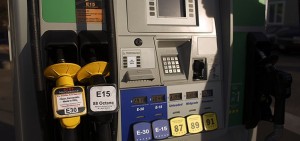The Bipartisan Policy Center’s (BPC) Energy Project seeks your input as part of a yearlong effort aimed at fostering constructive dialogue and action on reforming the Renewable Fuel Standard (RFS).
 BPC commissioned a series of background papers on various RFS topics. The first two papers, summarized below, approach the RFS from the standpoint of technology and infrastructure, considering both vehicles and the fuels supply chain.
BPC commissioned a series of background papers on various RFS topics. The first two papers, summarized below, approach the RFS from the standpoint of technology and infrastructure, considering both vehicles and the fuels supply chain.
Technical Barriers to the Consumption of Higher Blends of Ethanol [Read here]
The International Council on Clean Transportation
- “Taking all of these studies together, we conclude that vehicles model year 2001 or later can safely consume E15, provided warranty issues can be managed.”
- “Overall, this study finds that technical barriers [excluding cost, politics, and other factors] do not stand in the way of implementation of the RFS2 to 2022.”
Petroleum and Renewable Fuels Supply Chain [Read here]
Stillwater Associates LLC
- “The RFS plays a significant role in the transportation fuels supply chain.”
- “One of the implementation challenges with the RFS is the ethanol ‘blend wall.’ The Blend Wall is the point at which ethanol blending, as mandated by the RFS, exceeds E10.”
- “At some point, increased ethanol volume requirements will be satisfied only by blending at levels above 10 percent ethanol or by increasing gasoline demand.”
Please share your reaction to one or more of the perspectives detailed in these papers. What issues related to vehicles and the fuels supply chain are most important for policymakers to consider as they move forward with reforming the RFS? What other technology and infrastructure research/information would be most useful for policymakers?
BPC is convening a diverse RFS advisory group to discuss opportunities for reform, hosting public workshops to solicit broad input, and ultimately publishing viable policy options based, in part, on the advisory group’s deliberations.
While we don’t agree with everything in the recent ICCT report commissioned by the Bipartisan Policy Center, there are indeed some important takeaways that should help inform the debate over… Read more »
The Bipartisan Policy Center makes a fatal mistake by beginning its discussion with an assumption that the Renewable Fuel Standard is broken. Biofuel advocates do not concede that point… Read more »
Some simple facts of chemistry explain how ethanol (an alcohol), and biodiesel (fatty acids and methylated esters) are inferior in performance and more harmful to engines and infrastructure than gasoline… Read more »
Ike, Thank you! You seem to have provided a professional analysis of the FACTS. A beneficial albeit unusual posting! It will be interesting to see if there are any legitimate challenges. Jack… Read more »
Excellent reality check, Ike.
Thank you for your comments. Corrosion is an issue with ethanol/gasoline blends but mostly at concentrations higher than E15 and there are ways to address it – this is discussed… Read more »
Ms. Stephanie Searle reiterates the clean fuel lobby talking points well, but they are necessarily vague and unquantified. The devil is in the details. For example, consider her statement that… Read more »